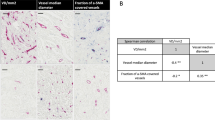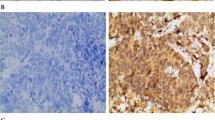Summary
Angiopoietin (Ang) is a ligand for the endothelium-specific tyrosine kinase receptor Tie-2, while a shift in the Ang-1:Ang-2 expression ratio in favor of Ang-2 was found to be associated with tumor angiogenesis. In the present study, we analyzed the immunohistochemical expression of Ang-2 in a series of 198 breast cancers, in which VEGF expression and microvessel density (MVD) were previously determined. Ang-2 expression was negative in 24 (12%), positive in 50 (25%) and strongly positive in 124 (63%) of 198 cases. A significant correlation was found between Ang-2 and VEGF expressions (p=0.0004) and between Ang-2 expression and MVD (p=0.0006), while a high MVD was found in 10 (77%) of 13 tumors with a strongly positive VEGF and positive Ang-2 expression and in 40 (71%) of 56 tumors with a strongly positive VEGF and strongly positive Ang-2 expression. Although there was no difference in the disease free survival (DFS) stratified according to Ang-2 expression alone, the 69 patients with a strongly positive VEGF and a strongly positive or positive Ang-2 expression had a significantly (p=0.0316) worse DFS than those with other combinations of VEGF and Ang-2 expressions. A multivariate analysis indicated lymph node metastasis and MVD to be independently significant prognostic factors for DFS, while the combination of VEGF and Ang-2 expressions was not a significant factor for DFS. In conclusion, the Ang-2 expression was found to be closely correlated with VEGF expression and MVD in breast cancer, while a high MVD was frequently found in tumors with a high expression of both VEGF and Ang-2. The survival analysis demonstrated a high MVD, which was induced by a high expression of both VEGF and Ang-2, to therefore have a strong prognostic significance in breast cancer.
Similar content being viewed by others
References
Folkman J, Angiogenesis in cancer, vascular, rheumatoid and other disease Nat Med 1:27–31, 1995
Weider N, Semple SP, Welch WR, Folkman J, Tumor angiogenesis and metastasis—correlation in invasive breast carcinoma N Engl J Med 324:1–8, 1991
Tsutsui S, Kume M, Era S, Prognostic value of microvessel density in invasive ductal carcinoma of the breast Breast Cancer 10:312–319, 2003
Tsutsui S, Yasuda K, Suzuki K, Tahara K, Higashi H, Era S, Macrophage infiltration and its prognostic implications in breast cancer: the relationship with VEGF expression and microvessel density Oncol Rep 14:425–431, 2005
Ferrara N, Gerber H, LeCouter J, The biology of VEGF and its receptors Nature Med 9:669–676, 2003
Maisonpierre PC, Suri C, Jones PF, Bartunkova S, Wiegand SJ, Radziejewski C, Compton D, McClain J, Aldrich TH, Papadopuolos N, Daly TJ, Davis S, Sato TN, Yacopoulos GD, Angiopoietin-2, a natural antagonist for Tie2 that disrupts in vivo angiogenesis Science 277:55–60, 1997
Holash J, Wiegand SJ, Yancopoulos GD, New model of tumor angiogenesis: dynamic balance between vessel regression and growth mediated by angiopoietins and VEGF Oncogene 18:5356–5362, 1999
Yancopoulos GD, Davis S, Gale NW, Rudge JS, Wiegand SJ, Holash J, Vascular-specific growth factors and blood vessel formation Nature 407:242–248, 2000
Tait CR, Jones PF, Angiopoietins in tumours; the angiogenic switch J Pathol 204:1–10, 2004
Holash J, Maisonpierre PC, Compton D, Boland P, Alexander CR, Zagzag D, Yancopoulos GD, Wieganad SJ, Vessel cooption, regression, and growth in tumors mediated by angiopoietins and VEGF Science 284:1994–1998, 1999
Oh H, Takagi H, Suzuma K, Otani A, Matsumura M, Honda Y, Hypoxia and vascular endothelial growth factor selectively up-regulate angiopoietin-2 in bovine microvascular endothelial cells J Biol Chem 274:15732–15739, 1999
Lobov IB, Brooks PC, Lang RA, Angiopoietin-2 displays VEGF-dependent modulation of capillary structure and endothelial cell survival in vivo Proc Natl Acad Sci USA 99:11205–11210, 2002
Visconti RP, Richardson CD, Sato TN, Orchestration of angiogenesis and arteriovenous contribution by angiopoietins and vascular endothelial growth factor (VEGF) Proc Natl Acad Sci USA 99:8219–8224, 2002
Osada H, Tokunaga T, Hatanaka H, Kawakami T, Tsuchida T, Abe Y, Tsugu A, Kijima H, Yamazaki H, Shima K, Osamura Y, Ueyama Y, Nakamura M, Gene expression of angiogenesis related factors in glioma Int J Oncol 18:305–309, 2001
Moon WS, Rhyu KH, Kang MJ, Lee DG, Yu HC, Yeum JH, Koh GY, Tarnawski AS, Overexpression of VEGF and angiopoietin 2: A key to high vascularity of hepatocellular carcinoma? Mod Pathol 16:552–557, 2003
Sun X, Liu X, Wu J, Cai X, Mou Y, Li J, Expression and significance of angiopoietin-2 in gastric cancer World J Gastroenterol 10:1382–1385, 2004
Zhang L, Yang N, Park J, Katsaros D, Fracchioli S, Cao G, O’brien-Jenkins A, Randall TC, Rubin SC, Coukos G, Tumor-derived vascular endothelial growth factor up-regulates angiopoietin-2 in host endothelium and destabilizes host vasculature, supporting angiogenesis in ovarian cancer Cancer Res 63:3403–3412, 2003
Currie MJ, Gunningham SP, Han C, Scott PAE, Robinson BA, Harris AL, Fox SB, Angiopoietin-1 is inversely related to thymidine phophorylase expression in human breast cancer, indicating a role in vascular remodeling Clin Cancer Res 7:918–927, 2001
Sfiligoi C, De Luca A, Cascone I, Sorbello V, Fuso L, Ponzone R, Biglia N, Audero E, Arisio R, Bussolino F, Sismondi P, De Bortoli M, Angiopoietin-2 expression in breast cancer correlates with lymph node invasion and short survival Int J Cancer 103:466–474, 2003
Mituhashi N, Shimizu H, Ohtsuka M, Wakabayashi Y, Ito H, Kimura F, Yoshidome Y, Kato A, Nukui Y, Miyazaki M, Angiopoietins and Tie-2 expression in angiogenesis and proliferation of human hepatocelluar carcinoma Hepatol 37:1105–1113, 2003
Tanaka F, Ishikawa S, Yanagihara K, Miyahara R, Kawano Y, Li M, Otake Y, Wada H, Expression of angiopoietins and its clinical significance in non-small cell lung cancer Cancer Res 62:7124–7129, 2002
Takanami I, Overexpression of Ang-2 mRNA in non-small cell lung cancer: association with angiogenesis and poor prognosis Oncol Rep 12:849–853, 2004
Ochiumi T, Tanaka S, Oka S, Hiyama T, Ito M, Kitadai Y, Haruma K, Chayama K. Clinical significance of angiopoietin-2 expression at the deepest invasive tumor site of advanced colorectal carcinoma Int J Onocol 24:539–547, 2004
Hata K, Nakayama K, Fujiwaki R, Katabuchi H, Okamura H, Miyazaki K, Expression of the angiopoietin-1, angiopoietin-2, Tie2, and vascular endothelial growth factor gene in epithelial ovarian cancer Gynecol Oncol 93:215–222, 2004
Lind AJ, Wikstrom P, Granfors T, Egevad L, Stattin P, Bergh A, Angiopoietin 2 expression is related to histological grade, vascular density, metastases, and outcome in prostate cancer Prostate 62:394–399, 2005
Tsutsui S, Yasuda K, Higashi H, Tahara K, Sugita S, Eguchi H, Kayashima H, Miyazaki N, Muto Y, Era S, Prognostic implication of p53 protein expression in relation to nuclear pleomorphism and the MIB-1 counts in breast cancer Breast Cancer 11:160–168, 2004
Volm M, Koomagi R, Mattern J, Prognostic value of vascular endothelial growth factor and its receptor Flt-1 in squamous cell lung cancer Int J Cancer 74:64–68, 1997
Etoh T, Inoue H, Tanaka S, Barnard GF, Kitano S, Mori M, Angiopoietin-2 is related to tumor angiogenesis in gastric carcinoma: Possible in vivo regulation via induction of proteases Cancer Res 61:2145–2153, 2001
Oka N, Yamamoto Y, Takahashi M, Nishitani M, Kanayama H, Kagawa S, Expression of angiopoietin-1 and -2, and its clinical significance in human bladder cancer BJU Int 95:660–663, 2005
Acknowledgements
We thank Naomi Ando for her expert technical assistance and also thank Brian Quinn for his review of this manuscript.
Author information
Authors and Affiliations
Corresponding author
Rights and permissions
About this article
Cite this article
Tsutsui, S., Inoue, H., Yasuda, K. et al. Angiopoietin 2 expression in invasive ductal carcinoma of the breast: its relationship to the VEGF expression and microvessel density. Breast Cancer Res Treat 98, 261–266 (2006). https://doi.org/10.1007/s10549-005-9157-9
Received:
Accepted:
Published:
Issue Date:
DOI: https://doi.org/10.1007/s10549-005-9157-9




